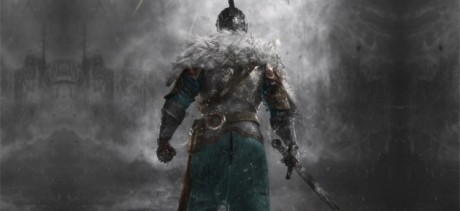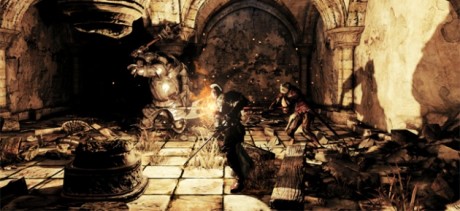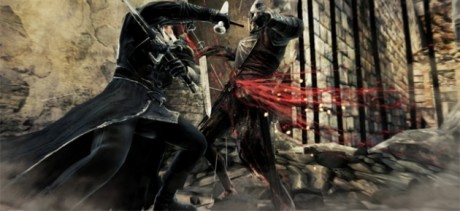
Our stamina bar drained slowly, as engulfed by utter darkness, the ominous sound of a huge armoured tortoise’s footsteps refused to fade into the black. This is the moment that it suddenly became clear that Dark Souls II would live up to every bit of its gruelling reputation – and not only in terms of difficulty, but also in its continuation of the franchise’s tense, heart-stopping combat and fantastic, atmospheric level design.
Tom and Kevin have both had the chance to play Dark Souls II and give their first impressions of this highly anticipated action RPG.
Creating a new entry in what is largely known as the hardest modern game available must be a tall order, and with the creators promising a more “accessible” instalment in the series, it’s no wonder that fans have been concerned about Dark Souls II.
After all, how can a game so unforgiving draw in any new players without sacrificing its very soul? With worried hearts, we unsheathed our swords in an attempt to discover whether the sequel would be worthy of its title.
And, as we emerged triumphant from the darkness, with blood dripping from the tips of our blades, we discovered that the core mechanics remain unscathed. Naturally, there have been tweaks and improvements, but the title has blossomed into a unique blend of its predecessors, with all of the secret storylines, complicated creatures, and labyrinth levels still intact.

Not everything has been left untouched, however. In fact, the very predicament that we touched upon during the opening of this impressions piece is a new addition to the Souls series. You can now choose to blindly brave complete darkness while holding onto your shield, or you can give up your trusty left arm in order to hold a flaming torch. It’s a system that gives yet more choice to common gameplay scenarios, but, in pure Dark Souls fashion, it also provides a lesson.
During the relatively short preview build we learned numerous ways to tackle specific enemies, and while prior knowledge of its predecessors will serve you well, there are a lot of changes to core elements that may catch veterans off guard. For starters, magic seems slightly less powerful than in previous games, but, akin to Demon’s Souls, there are now items that replenish mana, meaning that the arts can be used more often.
The combat system has also seen a plethora of refreshments which make for slightly slower, yet more visceral fights. One contributing factor to this is the overall rate at which characters move: simply removing clothes will no longer make your character quicker, as the new ‘agility’ statistic handles this exclusively. On the surface this sort of tweak may seem relatively pointless, but it improves the balancing of different character builds extremely well. To this end, adjustments have been made to other staples of battle: backstabbing is seemingly more difficult for bigger, more destructive weapons while parrying takes far more concentration, and now knocks enemies to the ground. However, dual wielding is the biggest addition to the combat system, meaning that come release, you’ll be able to successfully wield a weapon in each hand. While this could be done in the previous game, the feature has been completely revamped here, and now boasts unique animations and move sets that make using a dagger duo a very viable option.
Other improvements to the animation system are noticeable throughout. The incredible roster of unique movements for each weapon has been retained, but the characters now traverse the environment more realistically than ever before. The graphics too have seen advancements: surfaces appear to be less flat and the detail in armour and robes is remarkable. However, the most impressive update is in the lighting engine: fires and torches give off a tangible warm glow creating flickering shadows, while the light of the moon augments the landscape with a realistic blue sparkle. Even in this early state, it’s a gorgeous game, and if it’s anywhere near as huge as its little brother, then that’s a massive accomplishment.

After playing for just a few hours, it was clear that items would once again be strewn across the world, providing not only valuable and exciting loot but also driving forward the game’s story. Dark Souls is famous for having a puzzle piece storyline told through riddle-like item descriptions and brief non-playable character encounters, so fans of the series will be glad to see that this approach is returning.
As is the signature online aspect. Much like Journey, Dark Souls features a unique multiplayer mode whereby phantoms can offer assistance by writing hints and be summoned for co-operative play – or alternatively pen false messages and invade others’ game worlds. The new changes to this system, however, now make for an even more unforgiving online experience, as players can be invaded no matter which form they’re in: human or undead. Essentially, this means that there’s no hiding from invading phantoms, unless you disconnect your console from the Internet.
Further gut-wrenching alterations include the more hardcore health system, which means that every time a player dies after becoming undead, their maximum health will lower significantly until they recover their humanity. Thankfully, there are other aspects that have been changed to balance any fear of the difficulty rising too much. For example, humanity can now be restored anywhere on the map – not just at bonfires – and there are more health recovering items than just the Estus Flask. In many ways, the reworked system has a lot in common with Demon’s Souls.
For fans of the series, the changes to the core mechanics may seem drastic at first, but it’s easy to see the logic behind each decision; every nip and tuck covers a blemish that most won’t have even noticed existed in the previous title. This feels like a refinement in gameplay, balancing, and presentation – but everything that makes the series so great still remains in its entirety. It’s no wonder, then, that we took our worries and cast them into the flames of a bonfire.